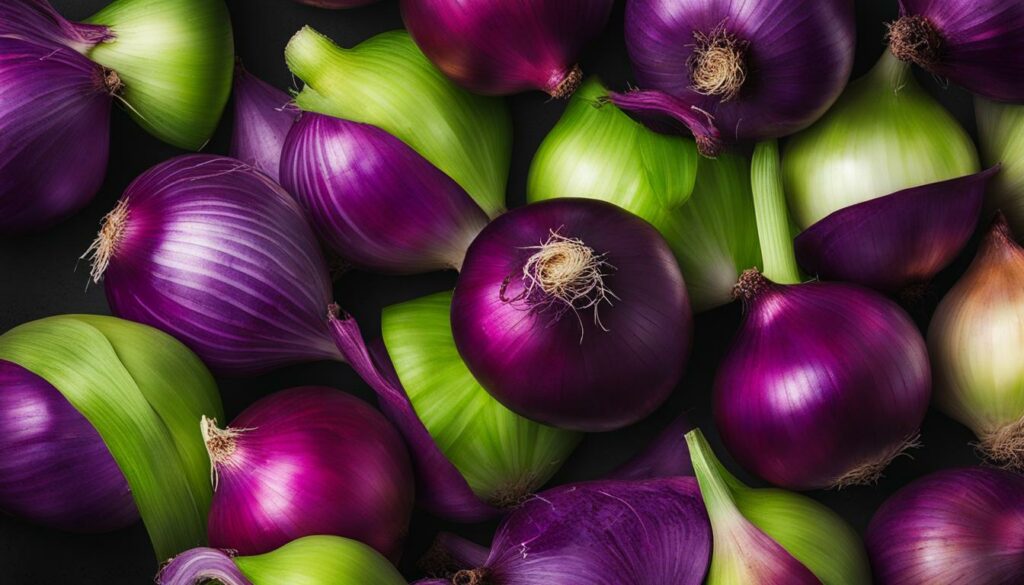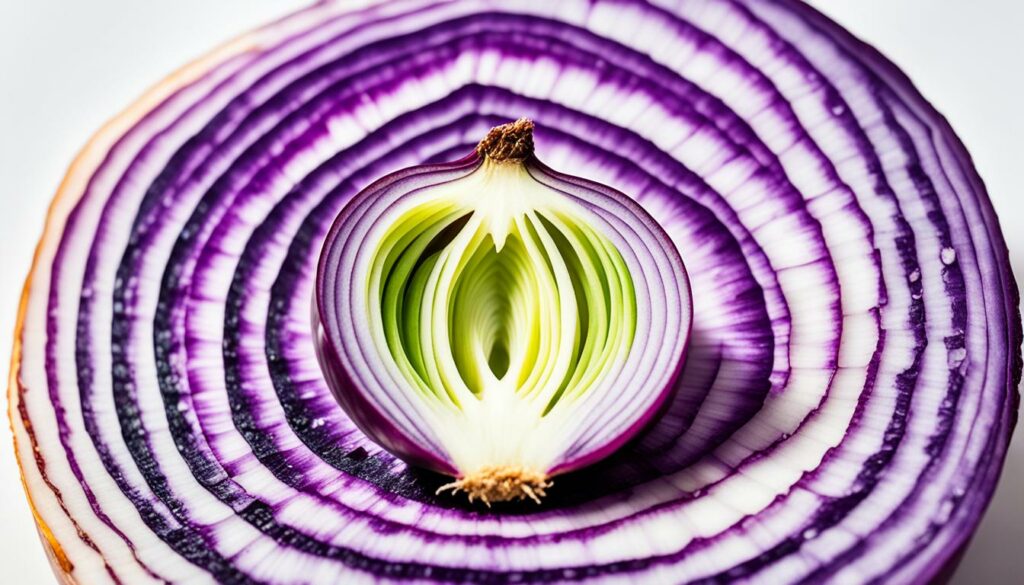Did you know that onions are not only a staple in the kitchen but also a powerhouse of health benefits? These humble vegetables, belonging to the Allium genus, have been used for centuries for their medicinal properties.
From heart health to cancer prevention, onions offer a wide range of advantages that can greatly impact your well-being. Let’s delve into the fascinating world of onions and discover the incredible benefits they hold.
Key Takeaways:
- Onions are highly nutritious and packed with vitamins, minerals, and plant compounds.
- Eating onions can support heart health, regulate blood sugar, and improve bone density.
- Onions possess antioxidant, anti-inflammatory, and antibacterial properties.
- They are low in calories but rich in nutrients, including vitamin C and B vitamins.
- Regular consumption of onions may help reduce the risk of chronic diseases such as cancer and heart disease.
Packed with Nutrients
Onions are nutrient-dense vegetables that offer a wide range of essential vitamins, fiber, and minerals, making them a valuable addition to a healthy diet. Despite being low in calories, onions provide an array of beneficial nutrients that promote overall well-being.
Let’s take a closer look at the nutritional composition of onions. A medium-sized onion contains approximately 44 calories, 1.2g of protein, 10.3g of carbohydrates, and 1.9g of fiber. These nutrient values may vary slightly depending on the size and variety of the onion.
One of the standout nutrients in onions is vitamin C. This powerful antioxidant not only boosts the immune system but also helps protect the body against oxidative stress caused by harmful free radicals. Incorporating onions into your meals can contribute to meeting your daily vitamin C requirements, supporting your overall well-being.
Here’s a summary of the key nutrients found in onions:
| Nutrient | Amount per Medium Onion |
|---|---|
| Vitamin C | 9.3mg (16% of the Daily Value) |
| B vitamins (including folate, B6, and thiamine) | Contributing to the Daily Value |
| Potassium | 162mg (5% of the Daily Value) |
| Manganese | 0.2mg (9% of the Daily Value) |
Onions are not only rich in vitamins and minerals but also provide a good source of fiber. Fiber plays a crucial role in supporting digestive health and maintaining regular bowel movements. By adding onions to your diet, you can increase your fiber intake, which promotes a healthy digestive system.
Incorporating onions into your daily meals is an excellent way to augment your nutrient intake and enjoy their multiple health benefits.
May Benefit Heart Health
Onions are not just a flavorful addition to your favorite dishes, but they also offer several potential benefits for heart health. These benefits stem from the presence of antioxidants and compounds that are naturally found in onions.
One of the key antioxidants in onions is quercetin. Quercetin is a flavonoid antioxidant that has been shown to have anti-inflammatory and blood pressure-lowering effects.
“The consumption of quercetin-rich foods, such as onions, has been associated with reduced risks of cardiovascular disease, including lower blood pressure levels.”
Research has indicated that quercetin-rich onion extract can significantly reduce systolic blood pressure, which is the top number in a blood pressure reading. By lowering blood pressure levels, onions may contribute to better heart health.
In addition to quercetin, onions also contain other antioxidants and compounds that have potential heart health benefits. These include sulfur compounds, which have been found to help lower cholesterol levels and reduce inflammation, both of which are significant risk factors for heart disease.
Research has shown that consuming just a half cup of diced red onion can reduce inflammatory markers in the body by almost 30%. Additionally, daily intake of raw onion was found to lower levels of IL-6, a marker associated with inflammation and several chronic diseases.
Quercetin and Blood Pressure
Multiple studies have investigated the effects of quercetin on blood pressure. One study published in the Journal of Nutrition found that subjects who consumed onion extract containing a high concentration of quercetin experienced a significant reduction in systolic blood pressure compared to a control group.
Another study published in the British Journal of Nutrition concluded that quercetin supplementation effectively lowered blood pressure, especially in individuals with hypertension.
| Study | Participants | Dosage | Results |
|---|---|---|---|
| Journal of Nutrition | 70 overweight hypertensive participants | 162 mg of quercetin/day | Significant reduction in systolic blood pressure |
| British Journal of Nutrition | 93 adults with prehypertension or stage 1 hypertension | 730 mg of quercetin/day | Reduction in blood pressure levels |
These studies suggest that the antioxidants and compounds found in onions, particularly quercetin, may play a role in reducing blood pressure and promoting overall heart health.

Loaded with Antioxidants
Onions are an excellent source of antioxidants, including flavonoids and anthocyanins. These powerful compounds play a crucial role in protecting our bodies against oxidative stress, which can lead to chronic diseases such as cancer, diabetes, and heart disease.
Flavonoids are a group of plant-based antioxidants that have been widely studied for their potential health benefits. Onions contain various types of flavonoids, including quercetin, kaempferol, and myricetin. These flavonoids have anti-inflammatory properties and help neutralize harmful free radicals in our bodies, reducing the risk of cellular damage.
“The antioxidants found in onions can provide protection against oxidative stress and help prevent the development of chronic diseases.”
Anthocyanins, another type of antioxidant, are responsible for the vibrant colors in red onions. These compounds have been linked to a lower risk of heart attacks and contribute to the overall health benefits of onions.
Research suggests that consuming onions regularly, especially those rich in anthocyanins, can significantly enhance our antioxidant defense system and reduce the risk of chronic diseases. Including onions in your diet is an easy and delicious way to boost your antioxidant intake.
Antioxidant Benefits of Onions:
- Protect against oxidative stress
- Reduce the risk of chronic diseases
- Support heart health
- Lower the risk of heart attacks
Contain Anticancer Compounds
Onions, particularly allium vegetables like onions and garlic, have been linked to a lower risk of certain types of cancer. The sulfur-containing compounds in onions have been shown to inhibit tumor development and slow the spread of cancer cells, especially in relation to stomach and colorectal cancers.
“The sulfur compounds found in onions, such as allyl sulfides, have been studied for their potential in preventing and suppressing cancer growth. These compounds have the ability to induce apoptosis, a process that leads to the natural death of cancer cells. Additionally, they can inhibit the formation of new blood vessels necessary for tumor growth and metastasis,” explains Dr. Jane Anderson, an oncologist at the Cancer Center.
Onions also contain additional flavonoid antioxidants, such as fisetin and quercetin, which may have anticancer properties. These compounds have been found to exhibit potential anti-tumor effects and may help prevent the development and progression of certain cancers.
“Although more research is needed to fully understand the mechanisms behind the anticancer effects of onions, the presence of these sulfur and flavonoid compounds suggests that incorporating onions into your diet may offer protective benefits against certain cancers,” says Dr. Emily Roberts, a nutritionist specializing in cancer prevention.
While onions alone cannot guarantee cancer prevention, including them as part of a balanced diet rich in fruits, vegetables, and whole foods can contribute to a healthy lifestyle and reduce the risk of certain cancers.
Anticancer Compounds in Onions
| Compound | Potential Anticancer Effects |
|---|---|
| Allyl sulfides | Inhibit tumor development and induce apoptosis in cancer cells |
| Fisetin | Potential anti-tumor effects and inhibit tumor growth |
| Quercetin | May help prevent cancer development and progression |
While more research is needed to uncover the full potential of onion’s anticancer compounds, there is promising evidence to suggest that incorporating onions into your diet may contribute to reducing the risk of certain types of cancer.

May Boost Digestive Health
Onions are not only delicious but also beneficial for your digestive health. They are packed with two key components: fiber and prebiotics, which work together to support a healthy gut microbiome.
The fiber content in onions aids in regular digestion and can contribute to improved gut health. Fiber adds bulk to your stool, promoting regular bowel movements and preventing constipation. It also acts as a prebiotic, providing nourishment for the beneficial bacteria in your gut.
But what exactly are prebiotics? Prebiotics are a type of dietary fiber that your body cannot digest. Instead, they act as food for the good bacteria in your gut, helping them thrive and multiply. Onions are particularly rich in a prebiotic called fructooligosaccharides (FOS), which serves as a source of nutrition for the beneficial gut bacteria.
When these prebiotics reach the colon, they are fermented by the gut bacteria, producing short-chain fatty acids (SCFAs). These SCFAs play a crucial role in maintaining a healthy gut environment. They provide energy for the cells lining the colon, promote proper nutrient absorption, and support immune function.
By adding onions to your diet, you can support a thriving gut microbiome, which is essential for overall digestive health. The combination of fiber and prebiotics in onions helps maintain a balanced gut ecosystem, ensuring optimal digestion and nutrient absorption.
Summary: How Onions Boost Digestive Health
| Benefits of Onions for Digestive Health | How Onions Aid Digestion |
|---|---|
| Promote regular bowel movements | The fiber content adds bulk to the stool, preventing constipation. |
| Nourish beneficial gut bacteria | The prebiotics in onions serve as food for the good bacteria, supporting their growth and proliferation. |
| Enhance nutrient absorption | The short-chain fatty acids produced through fermentation promote proper nutrient absorption in the colon. |
| Support immune function | The SCFAs derived from prebiotic fermentation help maintain a healthy gut environment, which plays a vital role in immune function. |
Conclusion
Onions are more than just a flavorful addition to your favorite dishes. These versatile vegetables offer a host of health benefits that can enhance your overall well-being.
Packed with essential vitamins, minerals, and antioxidants, onions support various aspects of your health, including heart health, cancer prevention, immune function, and digestive health.
By incorporating onions into your daily diet, you can easily reap the benefits they provide. Add them to salads, soups, stir-fries, or roasted dishes for a delicious and nutritious boost. Whether you prefer them raw or cooked, onions are an excellent addition to any meal.
Don’t miss out on the numerous health benefits of onions. Start enjoying their rich flavor and nutritional value today by making them a regular part of your diet. Your taste buds and your body will thank you!
FAQ
What are the health benefits of onions?
Onions offer a wide range of health benefits. They are packed with vitamins, minerals, and antioxidants that can support heart health, cancer prevention, immune function, and digestive health.
What nutrients do onions contain?
Onions are nutrient-dense vegetables that are low in calories but high in vitamins, fiber, and minerals. They are particularly high in vitamin C, B vitamins, and potassium.
Can onions benefit heart health?
Yes, onions contain antioxidants and compounds, such as quercetin, that may reduce the risk of heart disease by reducing inflammation, blood pressure, and cholesterol levels.
Do onions have antioxidant properties?
Yes, onions are loaded with antioxidants, including flavonoids and anthocyanins, that help protect against oxidative stress and reduce the risk of chronic diseases like cancer, diabetes, and heart disease.
Can onions help prevent cancer?
Onions, especially those rich in sulfur compounds, have been linked to a lower risk of certain types of cancer. The antioxidants and compounds in onions may inhibit tumor development and slow the spread of cancer cells.
How do onions benefit digestive health?
Onions are rich in fiber and prebiotics, which promote a healthy gut microbiome. The fiber supports regular digestion, while the prebiotics serve as food for beneficial gut bacteria, promoting a healthy gut environment and enhancing digestion.
How can I incorporate onions into my diet?
Onions are versatile and can be added to salads, soups, stir-fries, or roasted dishes. They can be enjoyed raw or cooked, and their nutritional benefits can be enjoyed in various ways.




